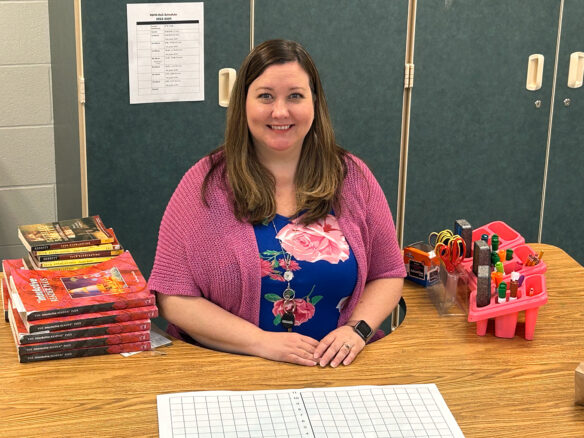
Melissa Smedley, a multi-tiered systems of support (MTSS) teacher at Royal Spring Middle School (Scott County), earned her National Board Certified Teacher designation in February. Submitted photo
After nearly two years of working towards her National Board for Professional Teaching Standards (NBCTS) certification, Melissa Smedley, a multi-tiered systems of support (MTSS) teacher at Royal Spring Middle School (Scott County), was one of 103 teachers who were newly certified and honored on Feb. 8.
“I was intimidated by all that it encompassed, but I took it as an opportunity to be a better teacher and look at it from that perspective,” said Smedley.
National Board certification is voluntary and open to all teachers currently teaching with a state-issued license. Certification can be issued after three years of teaching experience. Certification is available in 25 certificate areas, from preschool through 12th grade.
Kentucky has the 10th-largest class of new National Board Certified Teachers (NBCTs) in the country this year, and the Commonwealth now has 4,373 NBCTs overall. This year, 253 Kentucky educators opted to renew their certification as well.
Smedley said she knew she had a passion for math but never saw herself going into education growing up. As she got older and started to babysit, Smedley realized she had a love for helping and teaching children but when she went to college, she still wasn’t sure if that was her calling.
She graduated from Georgetown College with a degree in mathematics and a minor in physics and planned to go into engineering.
“I decided to also take some education classes just in case, because it was just in the back of my mind, maybe as a secondary route,” said Smedley.
The realization that she was meant to be a teacher came from one of her education classes in which she had been placed in a second-grade classroom. She changed her major that day.
“As soon as I left Garth Elementary School, I went right back to the education office at Georgetown College and changed my major,” said Smedley. “I knew that day I wanted to teach elementary kids forever.”
Smedley taught elementary students for 19 years. She recently took her current position when the opportunity opened at the middle school to combine her love for math and reading.
“When this opportunity came forth, I had attained my master’s as a reading and writing specialist for K-12 and I wanted to see if I could expand my skills and help the kids that were getting a little older who may still have a tough time reading or writing,” said Smedley.
Once she stepped into the role, she realized that her students were at a pivotal moment in their lives as they transition between elementary school and high school.
“Life is hard at that age; I try to explain to the kids that I understand that,” said Smedley. “I can’t understand every single little thing that each of them is going through, but I know that this age is a difficult one.”
Smedley said it took roughly two years for her to complete her certification.
The process requires nearly 400 hours of time and effort to achieve. Educators must submit a detailed portfolio that includes examples of student work, an outline of what teachers have done outside of the classroom to improve student achievement and video recordings that show how they teach and interact with students.
In addition, they must submit a reflective piece on student assessment and learning and then take a rigorous exam to demonstrate they have mastered the content of their chosen certification area.
“The components are based on things you are already doing as an educator. You use those things to try and get better and improve your skills every year,” said Smedley.
Like Smedley, Randi Skaggs, an 8th-grade English Language Arts teacher at J. Graham Brown School (Jefferson County), participated in the ceremony in February as an educator who maintained her NBCT certification.
“I remembered the process from the first time around and it was very similar,” said Skaggs. “It’s a very intense process but I came out the other side just a very different educator.”
Skaggs originally sought out her NBCT certification at a point in her life when she was at a crossroads.
“I’d been teaching for over a decade, and I was feeling burned out and unsure if I was in the right career,” said Skaggs. “Then I joined The Louisville Writing Project where I met some of the most dedicated and generous educators I’ve ever known.”
A group of educators from The Louisville Writing Project, Skaggs said, encouraged one another to achieve their National Board certification, holding one another accountable and giving each other feedback as they went through the process.
“The process of pursuing my National Boards helped me to see the why behind what I was doing as a teacher and helped me gain both clarity and confidence,” she said. “The process led me to build off practices that I found to be meaningful and to make changes to my instruction that wasn’t effective, upon reflection.”
Skaggs has now been an educator for the past 21 years and has moved through two different schools since attaining her original certification. She said that the skills and methods she learned have transformed over the years and have given her opportunities for growth and teacher leadership.
Upon successful completion of National Board certification, Kentucky teachers currently holding a Rank II certificate are eligible to apply for Rank I status, and those currently holding a Rank III certificate are eligible to apply for Rank II.
“The network of teachers in the NBCT world are the kind of professionals who bolster my love for this profession,” said Skaggs. “Surrounding myself with educators who are passionate about what they do and fervent in their desire to learn helps keep my morale.”
For more information about the National Board for Professional Teaching Standards and Kentucky NBCT guidelines for certification, visit the National Board for Professional Teaching Standards webpage and the KDE National Board Certification webpage.




Leave A Comment